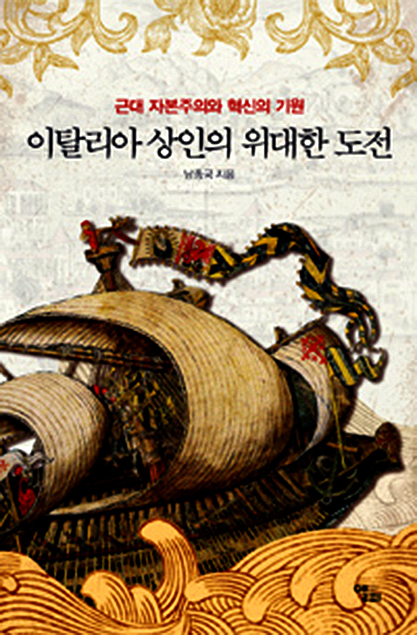본문
The Great Adventure of Medieval Italian Merchants: The Origin of Modern Capitalism and Innovation
by Prof. NAM, Jong Kuk (namjk0513@ewha.ac.kr )

This book deals with the Italian merchants in the cities, such as Venice, Genoa, Florence, and Siena, that played a leading role in the European economy from the 11th-15th centuries. It describes the adventure of the Italian merchants who, in pursuit of profits, traveled to the Champagne fairs by crossing the precipitous Alps; to Islamic and Byzantine worlds by crossing the rough Mediterranean despite the dangers of bad weather, shipwrecks and piracy; to Khanbaliq, the capital of the Mongol Empire by passing the tortuous dirt track of the Silk Road; and to southern India, the home of spices, via the Persian Gulf.
The book divides the golden age of Italian merchants from the 11th-15th centuries into three periods. This tripartite division takes into account the fact that Italian merchants experienced three significant structural changes during this age. The first period is from the Crusades to the mid-13th century. The typical tradesmen types during this period were “traveling” and “adventure” merchants. “Traveling merchants” refers to tradesmen who traveled from place to place carrying products while “adventure merchants” took the risk of exploring unfamiliar lands in search of greater profits. The second period, from the mid-13th to the mid-14th centuries, features the geographical expansion of Italian merchants’ stomping grounds and the emergence of major merchants who accumulated a handsome amount of capital. The keyword representing the third period, from the mid-14 century to the end of the 15th century, is “professionalism.” In medieval times, investment typically took place through risk diversification by separating capital into multiple products, as doing business in those days was fraught with risk and instability. However, business stabilized toward the end of the Middle Ages and trade measures, such as insurance, to cope with risks increased, giving rise to those who focused on a single product with a longer-term view.
This book analyzes nine merchants or groups of merchants from a broad perspective. Analysis of specific cases has been carried out because of the perception that summarizing and generalizing about the scope of merchants’ businesses and their activities while evaluating their overall political, economic, social, and cultural roles cannot fully demonstrate medieval Italian merchants’ characteristics. Indeed, Italian tradesmen display traits that vary widely, both at the individual level and by the time and region they lived in.
The first story is about Romano Mairano, a 12th-century merchant who lived in Venice. This story conveys the adventurous spirit of the merchant who crisscrossed everywhere from the Byzantine Empire to the Latin Empire in present-day Syria to Alexandria, Egypt to the Islamic cities in North Africa.
The second is about the merchant nobleman Ingo della Volta and his faction that dominated the politics and economy of Genoa in the 12th century. They did not hesitate to take advantage of their political influence in order to advance commercial interests; this is a good example of the universal truth that economics cannot be separated from politics. The third deals with the Tolomei Company of Siena that did business during the 13th century by traveling to the annual Champagne fairs. The company led flows of distribution and capital based on a new commercial technique, the so-called bill of exchange, thus demonstrating Italian merchants’ innovative tendencies.
The fourth recounts Venetian merchants who broke with the religious proscriptions of their time. This leads us to catch a glimpse of their states as merchants first and Christians second. As for the fifth story, there is a secret history regarding the merchants of Genoa and Venice who traveled to the distant land of Asia during the Mongol Empire in search of great profits. The history of their exploration of Asia, deemed a “blue ocean”—denoting its status as an untapped market—at the time, and going beyond Europe and the Mediterranean has been hidden due to fewer records left; in those days, information and knowledge about Asia were treated as confidential. The sixth is about the success and bankruptcy of the Peruzzi Company of Florence that developed into an international business magnate. Its success would have been impossible without collusion with the representative European political powers, including the Angevins of Southern Italy, the royal family of England, and the Papacy. This close relationship with politics, however, brought about the eventual fall of the company.
The seventh describes the Genoese merchants engaged in the alum trade at the end of the medieval period who showed that having a monopoly was the best trading technique at the time. In keeping with F. Braudel’s indication that capitalism was not about competitive free market trade, but rather the power to maintain monopolization, they were pioneers of capitalism. As for the eighth, there is La Fraterna Soranzo, a Venetian trading company from the 15th century that specialized in the cotton trade. The company was able to organize effective capital and commodities transactions by employing a double-entry bookkeeping system, presenting a feature of the modern capitalist enterprise. The last story depicts Francesco Datini, a merchant of Prato who left the greatest amount of records of all medieval Italian merchants. Those records allow one to grasp an earnest desire among Italian merchants of the time not only to achieve business success and wealth but also seek religious salvation. The life of Datini reminds us of the remark by Jacques Le Goff that the Christian ethical teaching denouncing commerce and usury served as an ideological barrier for medieval merchants, and that church’s economic ethics deterred the development of capitalism.
While following the journey of these Italian merchants, you will encounter those who lived in difficult times, took a leading role in the opening of a new era and ultimately earned reputations as pioneers of modern capitalism through their contributions.
* Related book
The Great Adventure of Medieval Italian Merchants: The Origin of Modern Capitalism and Innovation, Published by LPbook on April 30, 2015, 571 pages













